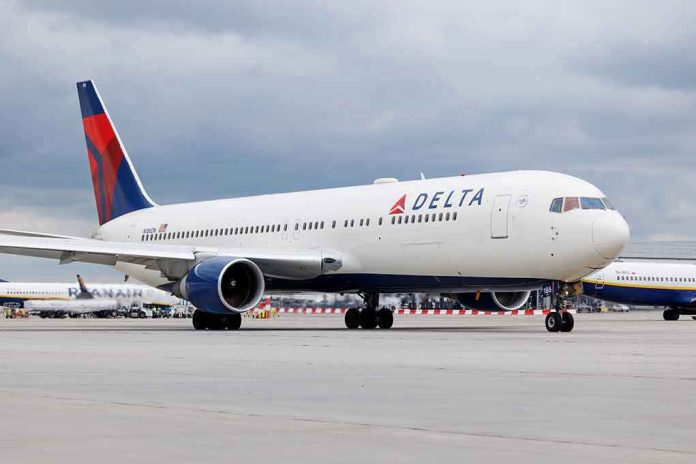
U.S. antitrust enforcers are moving to unwind Delta–Aeroméxico’s immunity, signaling a hard stop on alliances that thrive under foreign slot games hurting American consumers.
Story Snapshot
- DOJ backs DOT’s plan to revoke Delta–Aeroméxico antitrust immunity due to restrictive, non-transparent access at Mexico City’s MEX.
- Open market access was a condition for the JV’s 2016 approval; regulators say that precondition no longer exists.
- Revocation would end coordinated pricing, schedules, and capacity on U.S.–Mexico routes.
- Decision could set a precedent tying future alliances to real, sustained access at foreign hubs.
Regulators say the core condition for immunity has vanished
The Department of Justice formally urged the Department of Transportation to deny and withdraw antitrust immunity for the Delta Air Lines–Grupo Aeroméxico joint venture after finding that access at Mexico City International Airport has become restrictive and potentially discriminatory. Officials say the 2016 approval hinged on open, non‑discriminatory access at MEX, a “condition precedent” that enabled competition to discipline any benefits claimed by the alliance. With that condition gone, the legal basis for immunity is undermined.
DOT’s renewed review concluded that MEX slot allocation and entry constraints block rivals from contesting JV routes effectively, weakening consumer benefits otherwise attributed to coordinated networks. DOJ’s August 8–11, 2025 filing endorses that conclusion and reiterates that antitrust immunity must be granted sparingly and only when benefits are legitimate and realized. The pending DOT decision, now backed by DOJ, raises the likelihood that coordination on pricing, schedules, and capacity will be rolled back on U.S.–Mexico routes.
What revocation means for travelers, competition, and prices
Ending immunity would force Delta and Aeroméxico to unwind metal‑neutral coordination, prompting schedule resets, fare strategy changes, and less seamless connectivity in the near term. Competitors could gain room to expand, particularly if Mexico reforms slot governance to restore transparent access at MEX. Without those reforms, rivalry would likely intensify away from MEX flows while consumers see shifts in through‑fare options and loyalty benefits. The market’s largest combined provider losing immunity would reshape capacity decisions across key city pairs.
Industry data show roughly 14 airlines serve the U.S.–Mexico market, with Delta–Aeroméxico holding the largest combined share, around one‑fifth of seats as of August 2025. Regulators argue that concentrated share, combined with constrained entry at MEX, heightens risks that coordination can entrench market power rather than deliver consumer gains. By reaffirming that open access is non‑negotiable, the case signals tighter oversight of alliances where foreign slot regimes restrict competitive entry, aligning policy with consumer protection and transparent markets.
The larger signal: alliances must rest on open, contestable markets
A final DOT move to revoke immunity would set or reaffirm a precedent: U.S. approval for deep airline coordination depends on sustained, verifiable open access at critical foreign hubs. Future renewals could face stricter conditions tied to slot transparency and entry rules abroad. For conservatives who value free markets, the message is straightforward—no special treatment when foreign gatekeepers rig access. Enforcers are drawing a bright line that alliances cannot hide behind immunity when rivals are fenced out.
Regulators emphasize that competition—not centralized coordination—keeps fares honest and service responsive. If Mexico restores transparent, non‑discriminatory slot allocation at MEX, partners could re‑argue benefits under fair conditions. Until then, unwinding the JV’s immunity prioritizes consumer welfare and market entry. For readers frustrated by years of opaque deals and global favoritism, this action checks corporate power when it depends on foreign bottlenecks rather than fair competition, while pressing for genuine, rules‑based access abroad.
Sources:
Delta-Aeromexico Pact May Be Stifling Competition; DOJ Supports Ending Immunity: Report
“Condition Precedent” Eliminated: DOJ argues for the end of the Delta–Aeroméxico alliance
US DOJ wants to revoke antitrust immunity for Delta–Aeroméxico joint venture





